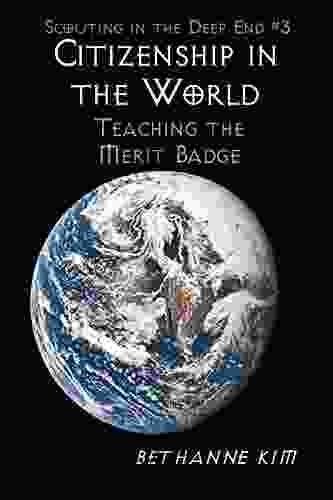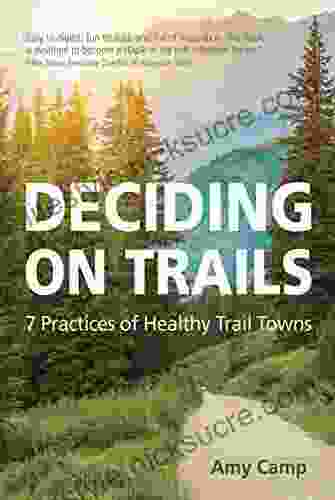Decolonizing Qualitative Inquiry With Youth And Communities

Qualitative inquiry is a valuable tool for understanding the experiences and perspectives of youth and communities. However, traditional qualitative research practices have often been rooted in colonial ideologies and power dynamics. This can lead to research that is extractive, exploitative, and disempowering for participants.
4.9 out of 5
| Language | : | English |
| File size | : | 1820 KB |
| Text-to-Speech | : | Enabled |
| Screen Reader | : | Supported |
| Enhanced typesetting | : | Enabled |
| Word Wise | : | Enabled |
| Print length | : | 295 pages |
Decolonizing qualitative inquiry is a critical approach to research that seeks to challenge and dismantle these colonial legacies. It is based on the principles of respect, reciprocity, and empowerment, and it prioritizes the voices and perspectives of those who have been historically marginalized.
In this article, we will explore the importance of decolonizing qualitative inquiry in research involving youth and communities. We will discuss the historical and contemporary contexts of colonization and its impact on research practices, and we will provide concrete strategies for decolonizing inquiry.
Historical and Contemporary Contexts of Colonization and Its Impact on Research Practices
Colonization is a complex and multifaceted process that has had a profound impact on the world, including on research practices. Colonization is the establishment and maintenance of political and economic control by one nation over another, and it often involves the exploitation and oppression of the colonized people.
The history of colonization is long and bloody, and its effects are still felt today. The legacy of colonialism includes racism, discrimination, and poverty, and it has shaped the way that research is conducted in many parts of the world.
Traditional qualitative research practices have often been influenced by colonial ideologies and power dynamics. These practices often view the researcher as the expert who has the knowledge and authority to define the research questions and interpret the data. This can lead to research that is extractive and exploitative, and it can disempower participants.
Decolonizing Qualitative Inquiry
Decolonizing qualitative inquiry is a critical approach to research that seeks to challenge and dismantle the colonial legacies in research practices. It is based on the principles of respect, reciprocity, and empowerment, and it prioritizes the voices and perspectives of those who have been historically marginalized.
There are many different ways to decolonize qualitative inquiry. Some examples include:
- Engaging in critical self-reflection: Researchers need to be aware of their own biases and assumptions, and they need to be willing to challenge them.
- Building relationships with community members: Researchers need to build relationships with community members based on trust and respect. This can take time and effort, but it is essential for creating a research process that is truly collaborative and empowering.
- Utilizing participatory and empowering research methodologies: Researchers can use participatory and empowering research methodologies to give participants more control over the research process. This can include involving participants in the design of the research project, the collection and analysis of data, and the interpretation of the results.
Decolonizing qualitative inquiry is a complex and challenging process, but it is essential for creating research that is ethical, respectful, and empowering for youth and communities.
Strategies for Decolonizing Qualitative Inquiry
There are many different strategies that researchers can use to decolonize qualitative inquiry. Some examples include:
- Engage in critical self-reflection. Researchers need to be aware of their own biases and assumptions, and they need to be willing to challenge them. This can be done through reading, attending workshops, and talking to other researchers.
- Build relationships with community members. Researchers need to build relationships with community members based on trust and respect. This can take time and effort, but it is essential for creating a research process that is truly collaborative and empowering. Researchers can build relationships by spending time in the community, getting to know people, and listening to their stories.
- Utilize participatory and empowering research methodologies. Researchers can use participatory and empowering research methodologies to give participants more control over the research process. This can include involving participants in the design of the research project, the collection and analysis of data, and the interpretation of the results. Participatory research methodologies can include community-based participatory research, photovoice, and narrative inquiry.
- Use decolonizing language. Researchers need to use decolonizing language in their research. This means avoiding language that is racist, sexist, homophobic, or ableist. It also means using language that is inclusive and empowering for participants.
- Share power and resources. Researchers need to share power and resources with participants. This can include sharing the results of the research with participants, giving participants access to resources, and supporting participants
4.9 out of 5
| Language | : | English |
| File size | : | 1820 KB |
| Text-to-Speech | : | Enabled |
| Screen Reader | : | Supported |
| Enhanced typesetting | : | Enabled |
| Word Wise | : | Enabled |
| Print length | : | 295 pages |
Do you want to contribute by writing guest posts on this blog?
Please contact us and send us a resume of previous articles that you have written.
 Fiction
Fiction Non Fiction
Non Fiction Romance
Romance Mystery
Mystery Thriller
Thriller SciFi
SciFi Fantasy
Fantasy Horror
Horror Biography
Biography Selfhelp
Selfhelp Business
Business History
History Classics
Classics Poetry
Poetry Childrens
Childrens Young Adult
Young Adult Educational
Educational Cooking
Cooking Travel
Travel Lifestyle
Lifestyle Spirituality
Spirituality Health
Health Fitness
Fitness Technology
Technology Science
Science Arts
Arts Crafts
Crafts DIY
DIY Gardening
Gardening Petcare
Petcare Deborah Lipsky
Deborah Lipsky John Mcpherson
John Mcpherson Amy Blakeslee
Amy Blakeslee Tim Marshall
Tim Marshall Stephenie Meyer
Stephenie Meyer Chris Irons
Chris Irons Joseph Conrad
Joseph Conrad Amy B Middleman
Amy B Middleman Brian Klaas
Brian Klaas Joseph Howse
Joseph Howse L Frank Baum
L Frank Baum Cody Monk
Cody Monk James E Packer
James E Packer Tom Colicchio
Tom Colicchio Torey L Hayden
Torey L Hayden Frederick Lenz
Frederick Lenz Amelia Freer
Amelia Freer Art Star
Art Star Valerie Bass
Valerie Bass Desi Northup
Desi Northup C W Lockhart
C W Lockhart Howard J Meditz
Howard J Meditz June Cl Tan
June Cl Tan Liz Fosslien
Liz Fosslien Naomi Oreskes
Naomi Oreskes Timothy Malcolm
Timothy Malcolm P Aarne Vesilind
P Aarne Vesilind Robyn Davidson
Robyn Davidson Jennifer Margulis
Jennifer Margulis Dima Zales
Dima Zales Tom Deck
Tom Deck James Mullaney
James Mullaney Steven Charleston
Steven Charleston John Ferrell
John Ferrell Clancy Cavnar
Clancy Cavnar Muhammad Vandestra
Muhammad Vandestra Pinky Mckay
Pinky Mckay Dolores Kong
Dolores Kong Jessica Hatcher Moore
Jessica Hatcher Moore Wendy Margolis
Wendy Margolis Cathy Williams
Cathy Williams Nina Freudenberger
Nina Freudenberger John L Field
John L Field Gal Dem
Gal Dem Pico Iyer
Pico Iyer Joel Cotton
Joel Cotton Gail Maccoll
Gail Maccoll A Sorority Of Mothers
A Sorority Of Mothers Sandra Bardwell
Sandra Bardwell Sarah Sumbal
Sarah Sumbal Maria Youtman
Maria Youtman Reinhold Messner
Reinhold Messner Paul Wieland
Paul Wieland Jon Bonnell
Jon Bonnell Mitt Romney
Mitt Romney Jan E Stets
Jan E Stets Christine Fanthome
Christine Fanthome Paul Graham
Paul Graham Laini Taylor
Laini Taylor Jeffrey Steadman
Jeffrey Steadman Lady Antiva
Lady Antiva Alan Margot
Alan Margot Louise Bates Ames
Louise Bates Ames Derrick Jensen
Derrick Jensen Tom Patri
Tom Patri Sarah Dessen
Sarah Dessen Steve Greenberg
Steve Greenberg Paul Dickson
Paul Dickson Mark Worden
Mark Worden Erik Qualman
Erik Qualman Stephen Barr
Stephen Barr Nisha Garg
Nisha Garg Sandra Luna Mccune
Sandra Luna Mccune Eric T Knight
Eric T Knight Rob Fisher
Rob Fisher John Jacobs
John Jacobs American Math Academy
American Math Academy Nikala Smith
Nikala Smith Ray Mancini
Ray Mancini Theresa Y Wee M D
Theresa Y Wee M D Eugene C Toy
Eugene C Toy Josh Taylor
Josh Taylor Rose Mannering
Rose Mannering Susan White
Susan White Jean Rose
Jean Rose Michael Ondaatje
Michael Ondaatje Thom Hartmann
Thom Hartmann Randy Schultz
Randy Schultz Amara Charles
Amara Charles Theodore Sider
Theodore Sider Brittany Clair
Brittany Clair Laurie A Watkins
Laurie A Watkins Laura Slinn
Laura Slinn Josephine Atluri
Josephine Atluri Frank Nappi
Frank Nappi Jd Mader
Jd Mader Umer W
Umer W Doug Peterson
Doug Peterson Ken Chaddock
Ken Chaddock Candy Verney
Candy Verney Oscar Baechler
Oscar Baechler Summer Michaud Skog
Summer Michaud Skog Charles Thompson
Charles Thompson Laekan Zea Kemp
Laekan Zea Kemp Amber Foster
Amber Foster John Lukacs
John Lukacs Test Masters
Test Masters Kathy Spratt
Kathy Spratt Shannon O Bourne
Shannon O Bourne Edward J Denecke
Edward J Denecke David Burch
David Burch Victoria Richards
Victoria Richards Amie Lands
Amie Lands James P Kelly
James P Kelly Amelia Parker
Amelia Parker Rosanna Davison
Rosanna Davison Jessica Cunsolo
Jessica Cunsolo Kristine Kathryn Rusch
Kristine Kathryn Rusch Eric Zweig
Eric Zweig Nick Kolenda
Nick Kolenda Garrett M Fitzmaurice
Garrett M Fitzmaurice Kathleen M Stacy
Kathleen M Stacy Andy Couturier
Andy Couturier Roman Gelperin
Roman Gelperin Stephen Goodwin
Stephen Goodwin Vinod Kumar Khanna
Vinod Kumar Khanna Cynthia Gabriel
Cynthia Gabriel K F Breene
K F Breene David Yoon
David Yoon Andy Hunt
Andy Hunt Amber Lee Sellers
Amber Lee Sellers Jonathan Law
Jonathan Law David Guymer
David Guymer Clotaire Rapaille
Clotaire Rapaille Chad Ford
Chad Ford Josiah Hesse
Josiah Hesse Gia Giasullo
Gia Giasullo H Bedford Jones
H Bedford Jones Rosalind Wiseman
Rosalind Wiseman Kasie West
Kasie West Jeff Martone
Jeff Martone E T Bryant
E T Bryant Susanna Heli
Susanna Heli Dan Abnett
Dan Abnett Jameson M Wetmore
Jameson M Wetmore Carlo Buzzichelli
Carlo Buzzichelli William Rosen
William Rosen Jocelyn Goodwin
Jocelyn Goodwin Stephen J Collier
Stephen J Collier Kathleen Glasgow
Kathleen Glasgow Benjamin Jelen
Benjamin Jelen Marco Ferrero
Marco Ferrero American Baseball Coaches Association
American Baseball Coaches Association Anne Chambers
Anne Chambers Sheena Johnstone
Sheena Johnstone Cheri Rae
Cheri Rae Jenny Landreth
Jenny Landreth Michelle Newhart
Michelle Newhart The 60 Minutes Summary
The 60 Minutes Summary Paul Kaplowitz
Paul Kaplowitz Jacob Bronowski
Jacob Bronowski Peter Larson
Peter Larson Joe Dan Lowry
Joe Dan Lowry Marisa Anne Bass
Marisa Anne Bass Jerry D Moore
Jerry D Moore Eric Tyndall
Eric Tyndall Tabitha Suzuma
Tabitha Suzuma Amy Mccready
Amy Mccready Michaela Riva Gaaserud
Michaela Riva Gaaserud Jennifer S Kelly
Jennifer S Kelly Shalabh Aggarwal
Shalabh Aggarwal Spike Dykes
Spike Dykes Bethanne Kim
Bethanne Kim Martin Pollizotto
Martin Pollizotto Lars Andersen
Lars Andersen Mac Fortner
Mac Fortner Kate Parham Kordsmeier
Kate Parham Kordsmeier Joseph Mcmoneagle
Joseph Mcmoneagle Redmond O Hanlon
Redmond O Hanlon Erica T Lehrer
Erica T Lehrer Robert A Weinberg
Robert A Weinberg K M Shea
K M Shea Vince Kotchian
Vince Kotchian Sandra T Barnes
Sandra T Barnes Theresa I Soto
Theresa I Soto Richard Wagamese
Richard Wagamese Peter Worley
Peter Worley Peter Hayes
Peter Hayes Joseph P Weir
Joseph P Weir Vivian Vande Velde
Vivian Vande Velde Robert W D Ball
Robert W D Ball Pamela Lynn
Pamela Lynn Joan Freeman
Joan Freeman Jeff Gaudette
Jeff Gaudette Warren B Powell
Warren B Powell Buck Tilton
Buck Tilton Fred Pyrczak
Fred Pyrczak Catherine Dees
Catherine Dees Courtney Defeo
Courtney Defeo Ruth Nestvold
Ruth Nestvold Diane Greer
Diane Greer Sarah J Maas
Sarah J Maas Saleh Alkhalifa
Saleh Alkhalifa Gina Chen
Gina Chen Rob Antoun
Rob Antoun Ronda Rousey
Ronda Rousey Jake Maddox
Jake Maddox Jack Weatherford
Jack Weatherford Byron Nelson
Byron Nelson Bill Carter
Bill Carter Toni Tone
Toni Tone Jack Freeman
Jack Freeman Jack Falla
Jack Falla William Bohan
William Bohan Richard Cohen
Richard Cohen Temple Grandin
Temple Grandin Sonia Hartl
Sonia Hartl Jan Marie Mueller
Jan Marie Mueller Craig Larman
Craig Larman Amby Cooper
Amby Cooper Kevin Stiegelmaier
Kevin Stiegelmaier Wolf Moon
Wolf Moon Alex Polyakov
Alex Polyakov David Salsburg
David Salsburg Matthew Lombardi
Matthew Lombardi Henry A Zumbrun 2
Henry A Zumbrun 2 William Glasser M D
William Glasser M D Ned Seaton
Ned Seaton Tanya Turner
Tanya Turner Michael R Poll
Michael R Poll Don Bowers
Don Bowers Amir Alexander
Amir Alexander Silvia Botros
Silvia Botros Django Paris
Django Paris Amit Saha
Amit Saha Stephen M Barr
Stephen M Barr Joseph Wayne Smith
Joseph Wayne Smith Wade Rouse
Wade Rouse Sarah Woodbury
Sarah Woodbury Jeanne Ryan
Jeanne Ryan Mark Taylor
Mark Taylor Krystal Sutherland
Krystal Sutherland Marshall Goldsmith
Marshall Goldsmith Malba Tahan
Malba Tahan William G Dever
William G Dever Michael Winkelman
Michael Winkelman Jim Santos
Jim Santos Camille Glenn
Camille Glenn Victor J Stenger
Victor J Stenger Sue Monk Kidd
Sue Monk Kidd Antonio R Damasio
Antonio R Damasio Bridget Ericsson
Bridget Ericsson J Marin Younker
J Marin Younker Dana Obleman
Dana Obleman Heidi J Larson
Heidi J Larson Paul Schwartz
Paul Schwartz Amber Lia
Amber Lia Stanley J Farlow
Stanley J Farlow Paul Oliver
Paul Oliver Sean Gibson
Sean Gibson Gary Wiener
Gary Wiener Amy Brown
Amy Brown Sharon K Zumbrunn
Sharon K Zumbrunn Charles Hall
Charles Hall Claudia J Carr
Claudia J Carr Topher Donahue
Topher Donahue Jenni Hicks
Jenni Hicks Pav Bryan
Pav Bryan Janet Engle
Janet Engle Mike Adamick
Mike Adamick Tracy Lorraine
Tracy Lorraine Gerald Corey
Gerald Corey Christina Kamp
Christina Kamp Amira Mikhail
Amira Mikhail Amy Bleuel
Amy Bleuel Joe Nickell
Joe Nickell Vicki Hearne
Vicki Hearne Cole Hersowitz
Cole Hersowitz Kate Fox
Kate Fox Victoria Wood
Victoria Wood Meikang Qiu
Meikang Qiu Kenneth P Stephens
Kenneth P Stephens Sheri Van Dijk
Sheri Van Dijk Tim Hornbaker
Tim Hornbaker Amber Smith
Amber Smith Stanley I Greenspan
Stanley I Greenspan Ned Vizzini
Ned Vizzini Md Rezowan Ahmed
Md Rezowan Ahmed Christopher Cousteau
Christopher Cousteau Marina Robb
Marina Robb Kathy A Zahler
Kathy A Zahler Martin Williams
Martin Williams Melody Schreiber
Melody Schreiber Dr Scott A Johnson
Dr Scott A Johnson Joe Dante
Joe Dante Dave Hanson
Dave Hanson Eugenia Viti
Eugenia Viti Md Mahady Hasan
Md Mahady Hasan Deborah J Rumsey
Deborah J Rumsey Norman Doidge
Norman Doidge Ignatius Donnelly
Ignatius Donnelly Paul Kockelman
Paul Kockelman Autumn Jordon
Autumn Jordon Christopher E Larsen
Christopher E Larsen Douglas Wilson
Douglas Wilson Amber Zygutis
Amber Zygutis J Stephen Jones
J Stephen Jones Brendan Leonard
Brendan Leonard Amrita Pande
Amrita Pande Ryan Gray
Ryan Gray Swede Burns
Swede Burns Amiee Mueller
Amiee Mueller Jonathon Miller Weisberger
Jonathon Miller Weisberger Amy Adele Hasinoff
Amy Adele Hasinoff Brian Pace
Brian Pace Mark W T Harvey
Mark W T Harvey James W Williams
James W Williams Eric E Bowne
Eric E Bowne Neville Goddard
Neville Goddard Tijan
Tijan Amy Perry
Amy Perry Jason Thompson
Jason Thompson Michael Cosgrove
Michael Cosgrove Chloe Gong
Chloe Gong Jean Christie Ashmore
Jean Christie Ashmore Katherine Kurtz
Katherine Kurtz Andrey Ryanskiy
Andrey Ryanskiy William Stillman
William Stillman Julie Barlow
Julie Barlow Kieron Gillen
Kieron Gillen Jonathan Bartlett
Jonathan Bartlett Rich Rousseau
Rich Rousseau Larry K Brendtro
Larry K Brendtro Denise Ni
Denise Ni Iain Pardoe
Iain Pardoe Rick Deutsch
Rick Deutsch Hadley Wickham
Hadley Wickham Philip Gibson
Philip Gibson Nicholeen Peck
Nicholeen Peck Kate Tietje
Kate Tietje Julie Mosier
Julie Mosier Emma Mae Jenkins
Emma Mae Jenkins Dom Amore
Dom Amore Derek Thompson
Derek Thompson Anthony Horowitz
Anthony Horowitz Amy Baldwin
Amy Baldwin Jason Borte
Jason Borte Joseph Klaits
Joseph Klaits Tamora Pierce
Tamora Pierce Don Orwell
Don Orwell Don Stradley
Don Stradley Holly Herrick
Holly Herrick Shaun Gallagher
Shaun Gallagher Ellie Wood
Ellie Wood Mark Stallard
Mark Stallard Candida Lawrence
Candida Lawrence Donovan Hohn
Donovan Hohn Marit Weisenberg
Marit Weisenberg Michael Reichert
Michael Reichert Robb Walsh
Robb Walsh Joellen Patterson
Joellen Patterson Brian Kateman
Brian Kateman Kezia Endsley
Kezia Endsley Ashley Scott
Ashley Scott Jack Nisbet
Jack Nisbet Andy Singleton
Andy Singleton Isabella Krystynek
Isabella Krystynek Michael Parker Pearson
Michael Parker Pearson Tom Taulli
Tom Taulli Patricia L Papernow
Patricia L Papernow Cordelia K Castel
Cordelia K Castel Adam Cort
Adam Cort Randall E Schumacker
Randall E Schumacker Amante P Marinas
Amante P Marinas Sterling Test Prep
Sterling Test Prep Trent Shelton
Trent Shelton Charles J Alsheimer
Charles J Alsheimer Amie Kaufman
Amie Kaufman Erin Chack
Erin Chack Leslie Sansone
Leslie Sansone John Maxwell Wood
John Maxwell Wood Don Mann
Don Mann J L Weil
J L Weil Cookie O Gorman
Cookie O Gorman Mark Turley
Mark Turley Karen Deerwester
Karen Deerwester Lisa Zimmer Hatch
Lisa Zimmer Hatch Sian Warriner
Sian Warriner Sarah Morgan Haydock
Sarah Morgan Haydock Dan Schlossberg
Dan Schlossberg Jean Van T Hul
Jean Van T Hul Terry Wieland
Terry Wieland Suzanne Stabile
Suzanne Stabile Kumo Kagyu
Kumo KagyuK D
 Tyler Simmons
Tyler Simmons Harley Reid
Harley Reid Rick Stanton
Rick Stanton Philippa Langley
Philippa Langley Patrick O Sullivan
Patrick O Sullivan Shanna Cunning
Shanna Cunning Therese A Rando
Therese A Rando Jeremy J Baumberg
Jeremy J Baumberg Ruth M Tappen
Ruth M Tappen Alex Stone
Alex Stone Helena P Blavasky
Helena P Blavasky Matthew L Martin
Matthew L Martin David Elkington
David Elkington Ana And Jack Hicks
Ana And Jack Hicks C L Simchick
C L Simchick Anthony Haynes
Anthony Haynes Tahlia Kirk
Tahlia Kirk Anna B Doe
Anna B Doe Johan Norberg
Johan Norberg Trevor Day
Trevor Day Julie Caplin
Julie Caplin Dr Elizabeth Cherevaty Nd Rac
Dr Elizabeth Cherevaty Nd Rac Rachel Gurevich
Rachel Gurevich Alexandrea Weis
Alexandrea Weis Deborah Vinall Psyd Lmft
Deborah Vinall Psyd Lmft Traci Gormley
Traci Gormley Rodney M Howard Browne
Rodney M Howard Browne Amber O Neal Johnston
Amber O Neal Johnston John Bingham
John Bingham Amy Camp
Amy Camp Julie Schacht Sway
Julie Schacht Sway Helen E Fisher
Helen E Fisher David Grinspoon
David Grinspoon Kyle Hunt
Kyle Hunt American Psychological Association
American Psychological Association Amelia Edith Huddleston Barr
Amelia Edith Huddleston Barr Elizabeth Lim
Elizabeth Lim Alan I Marcus
Alan I Marcus Angela Moore
Angela Moore Dr Bob Rotella
Dr Bob Rotella Nicholas A Christakis
Nicholas A Christakis Tavi Gevinson
Tavi Gevinson Mariano Anaya
Mariano Anaya Devin Olsen
Devin Olsen Shere Hite
Shere Hite Danny Dreyer
Danny Dreyer Michael Abayomi
Michael Abayomi Lizabeth Hardman
Lizabeth Hardman Ananda Lowe
Ananda Lowe Grant Dever
Grant Dever Arlene Blum
Arlene Blum Jack Tupp
Jack Tupp Amy Bizzarri
Amy Bizzarri Nathan Belofsky
Nathan Belofsky Donna Williams
Donna Williams Stephen Walker
Stephen Walker Guillaume Haeringer
Guillaume Haeringer Elise Christie
Elise Christie Christopher Harlan
Christopher Harlan Robert Melillo
Robert Melillo Heather Macfadyen
Heather Macfadyen Nikhil Bhardwaj
Nikhil Bhardwaj Thomas J Whalen
Thomas J Whalen Kris Leonard
Kris Leonard Kresley Cole
Kresley Cole George Bernard Shaw
George Bernard Shaw Catherine Ryan Gregory
Catherine Ryan Gregory Chris Carlsson
Chris Carlsson Elizabeth S Gilbert
Elizabeth S Gilbert John A Buehrens
John A Buehrens David Ranney
David Ranney Glenn Stout
Glenn Stout Lisa Maloney
Lisa Maloney Jayson Gaddis
Jayson Gaddis Zeshan Qureshi
Zeshan Qureshi Steven C Hayes
Steven C Hayes Dmv Test Bank
Dmv Test Bank Erika Napoletano
Erika Napoletano Jack Ewing
Jack Ewing Chad Starkey
Chad Starkey Bruce Dowbiggin
Bruce Dowbiggin Sean Go
Sean Go Ruta Nonacs
Ruta Nonacs Joe E Harvey
Joe E Harvey
Light bulbAdvertise smarter! Our strategic ad space ensures maximum exposure. Reserve your spot today!

 Colin RichardsonBest Hiking In Central Colorado Around Aspen Marble Leadville Buena Vista And
Colin RichardsonBest Hiking In Central Colorado Around Aspen Marble Leadville Buena Vista And
 Isaac AsimovHandbook for Graduate Students: A Comprehensive Guide to Thriving in Academia
Isaac AsimovHandbook for Graduate Students: A Comprehensive Guide to Thriving in Academia Mason PowellFollow ·5k
Mason PowellFollow ·5k Brody PowellFollow ·19.3k
Brody PowellFollow ·19.3k Junichiro TanizakiFollow ·19.3k
Junichiro TanizakiFollow ·19.3k Brett SimmonsFollow ·2.4k
Brett SimmonsFollow ·2.4k Nathan ReedFollow ·18k
Nathan ReedFollow ·18k Guillermo BlairFollow ·12.4k
Guillermo BlairFollow ·12.4k Boris PasternakFollow ·16.9k
Boris PasternakFollow ·16.9k Pat MitchellFollow ·10.4k
Pat MitchellFollow ·10.4k

 Ira Cox
Ira CoxUnveiling the Hidden Gem: Moon, Virginia - A Washington...
Nestled within the picturesque...

 Jorge Luis Borges
Jorge Luis BorgesThe Ultimate Survivalist's Medical Guide: A Comprehensive...
In the realm of...

 Henry Green
Henry GreenDavid Douglas: Exploring the Natural History of the...
David Douglas was a...

 Eric Hayes
Eric HayesUnderstanding Citizenship in a Globalized World: A...
Citizenship is a complex and multifaceted...

 Will Ward
Will WardUnveiling Research Real Talk: Navigating the Labyrinth of...
Research, the...
4.9 out of 5
| Language | : | English |
| File size | : | 1820 KB |
| Text-to-Speech | : | Enabled |
| Screen Reader | : | Supported |
| Enhanced typesetting | : | Enabled |
| Word Wise | : | Enabled |
| Print length | : | 295 pages |










